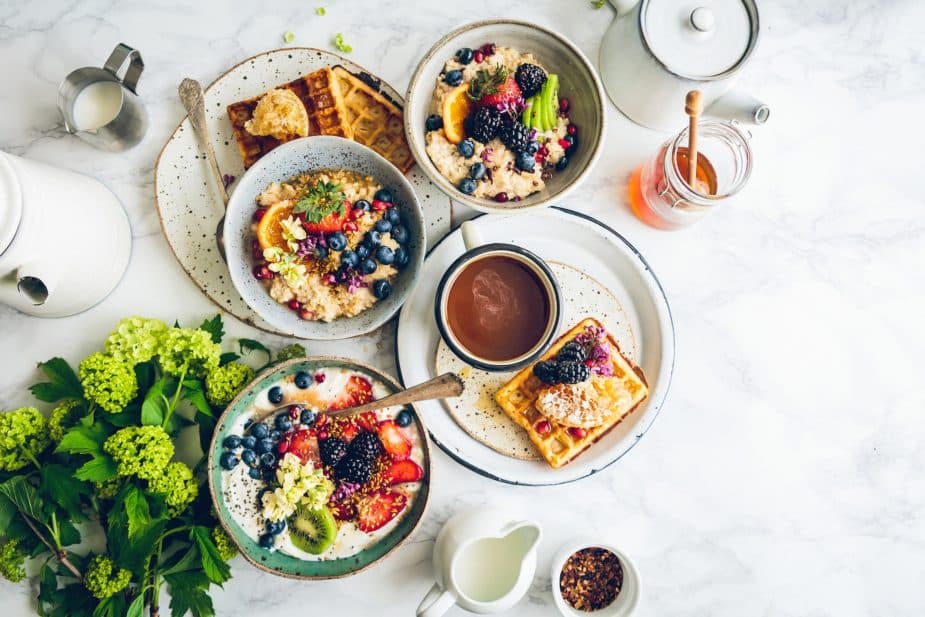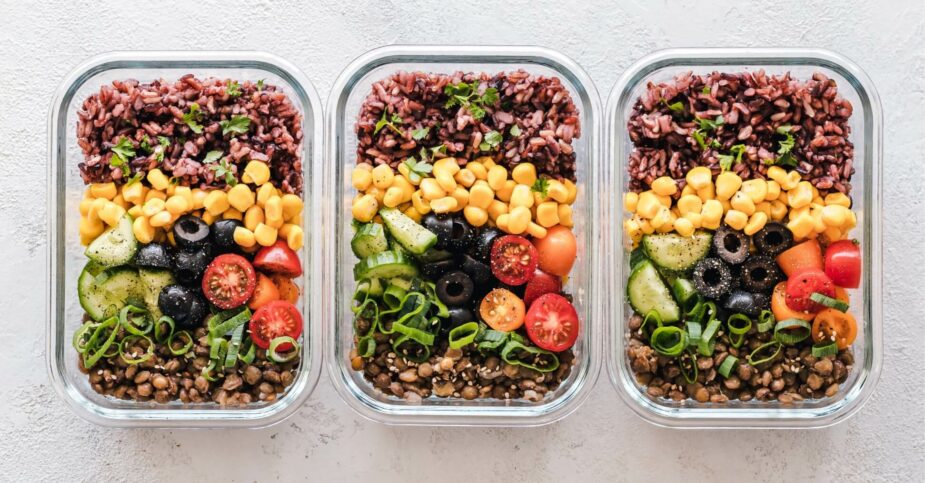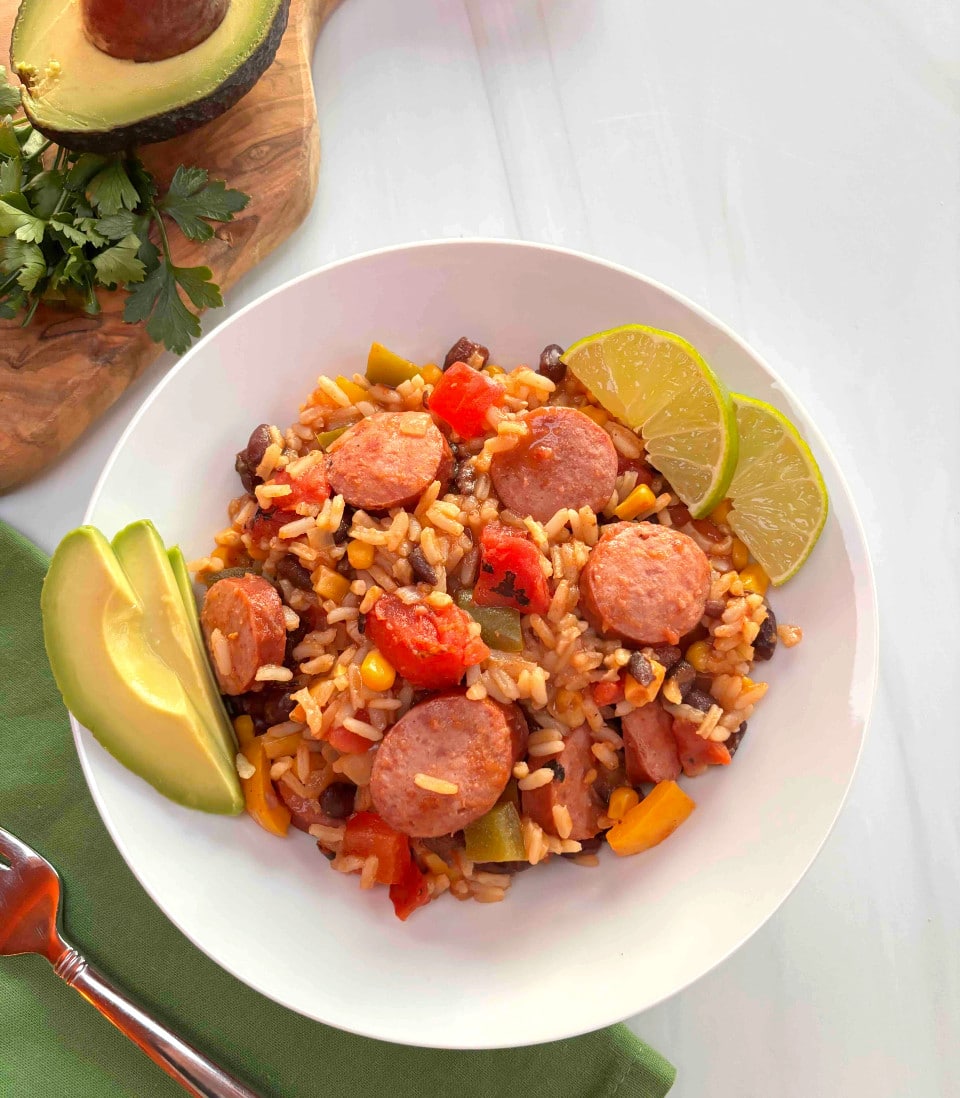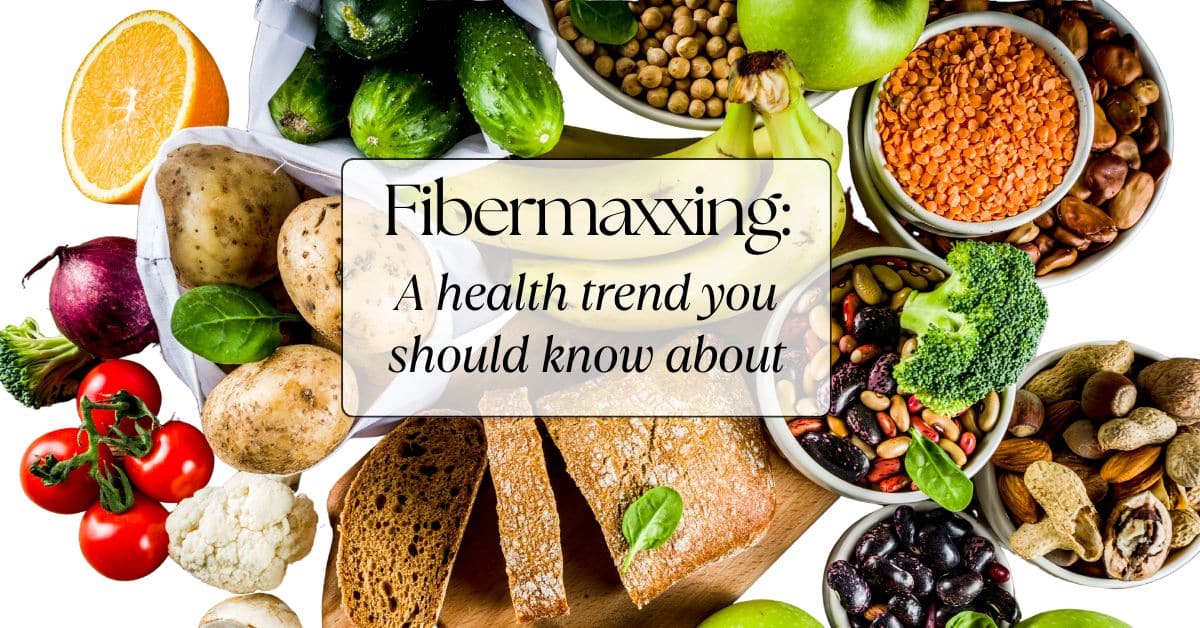You walk purposefully into the room and then pause…Hum, now why did I come in here?
How often does this happen to you? You walk into a room to get something and can’t remember what you are looking for?
Or maybe you’re noticing that the crossword puzzles and number games just aren’t as easy as they once were?
You aren’t alone. And while these are normal signs of aging, there may be some things you can do to delay it and protect your brain as you age. What you eat can play a key role in this.
As a registered dietitian, I often get asked questions about the connection between brain health and food. And it’s personal too – as someone with a family history of dementia, I’ve always been interested in how what we eat affects our brain. Are there good foods for your brain?
This article will review what happens to your brain as you age, how diet plays a role in your brain health, what are the best foods and nutrients for brain health, and tips for eating for brain health.
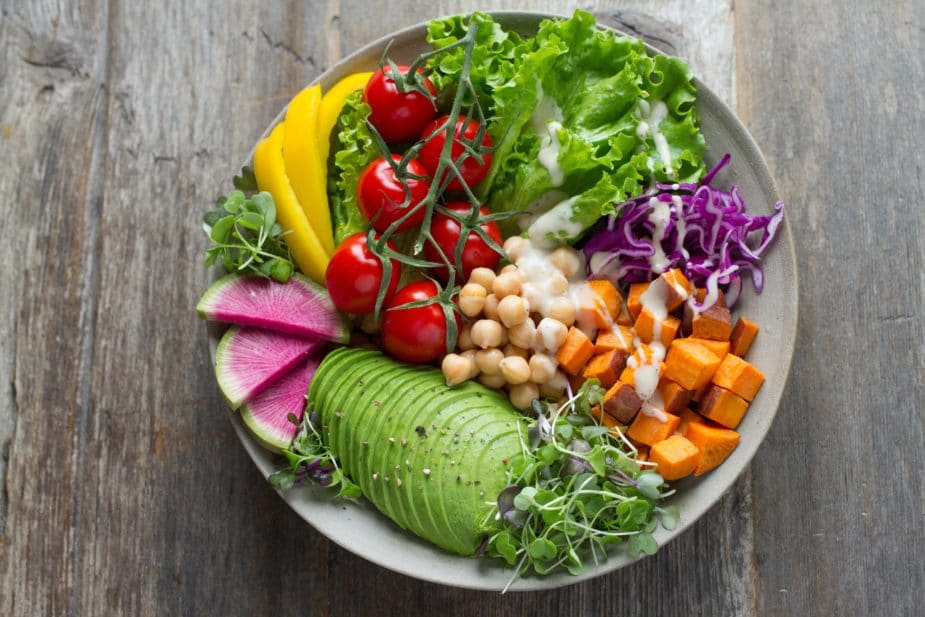
Table of Contents
Your brain
Your brain is the most important organ in your body. It controls everything from your breathing to your heartbeat to your digestion. It sends signals to other organs so your body can do what it needs to do.
Our brains are affected by what we eat. Just like other parts of our body, our brain requires fuel, and high-quality fuel to function adequately. Like putting gas in a car. The better the quality gas, the better the gas mileage, and the same is true for our brain.
The best food and nutrients for our brain are really the same things that are good for the rest of our body. Fruits, vegetables, whole grains, seafood, nuts, and seeds are among some of the best. They are all rich in nutrients that support our brain health.
What does it mean to have a healthy brain? A healthy brain sends appropriate signals to the different parts of our body.
A healthy brain regulates our mood, helps us sleep, helps us digest food, remember important things, learn new things, and keeps us coordinated and moving.
The brain is one of the organs that use the most energy. It requires a lot of glucose (aka sugar) to function and many of the nutrients from the foods we eat help all the different areas of the brain continue to work efficiently.
For instance, the omega-3 fatty acid DHA is found in abundance in our brain and is essential to the growth and development of a baby’s brain. It is also becoming apparent that DHA may have a role in protecting areas of our brain from inflammation, the harmful effects of oxidation, and plaque build-up.

Other nutrients from the foods we eat can affect everything from how we react to stress, to our memory, coordination, and how well we sleep. Antioxidants protect from inflammation and oxidation, some help to reduce cortisol production and release serotonin which helps us get better sleep.
There are communication hubs throughout your brain and neurotransmitters and hormones that aid in communication. Keeping all those hubs healthy and clear from plaque is critical so they function optimally.
But it is normal as you age for your brain to start slowing down or not work as efficiently as normal. And just like for your heart, there are foods that will help keep those brain communication pathways in tip-top shape.
Foods like fruits and vegetables, beans and nuts, and seeds. These are all part of a brain-boosting diet called the MIND diet. It is one of the best diets to follow for brain health and I’ll be sharing more about that at the end of this article so keep reading!
What happens to your brain as you age
While you can see or feel other parts of your body change as you age – like your knees or back telling you you did a little too much time after a weekend of gardening – you probably don’t think about changes that are happening in your brain.
The first time you may realize a change may be when you start forgetting or misplacing things. But the changes in your brain start happening long before you forget why you walked into a room
Your brain actually shrinks a little, starting in your 30s. You lose about five percent every decade after that. And while this is normal, this may be when you may notice these little changes start to happen.
As we get older, more things change. This includes the buildup of plaque and the reduction of some hormones that help us think clearly and respond quickly.
These changes can slow your memory, your reaction time, and coordination. It can also change how we respond to different emotional situations, how well we sleep, and even how well our gastrointestinal (GI) tract works.
The good news is that we can keep our brains healthy longer through the food and lifestyle choices we make.
How Food Can Impact Brain Health
Food impacts your brain health in a myriad of ways. From our GI tract to our mood and emotions, our ability to focus, learn, and remember, and even how well we sleep. Let’s cover each of these and some different foods that help, one by one.
The Gut: Brain connection
Have you ever noticed when you are stressed that your stomach hurts? Or that some people with Irritable bowel syndrome (IBD) may complain about worsening GI symptoms when stressed or fatigued.
While they seem like completely separate organs that would never “talk” to each other, they actually have quite a communication system going. The emotional and cognitive centers of our brain seem to be directly impacted by the health of our GI tract, and vice versa.
This connection between our GI tract and our brain is called the gut-brain axis.
Communication happens through this axis and it impacts our mood, reaction time, feelings, sleep patterns, and even dementia risk.
So, how does our diet play a role? Keeping our GI tract healthy by feeding it the right types of foods is the best place to start. That is where prebiotics and probiotics play a role.
Prebiotics
Prebiotics are foods that are rich in fiber or non-digestible carbohydrates. Think of them as the food for your GI tract.
Foods like fruits, vegetables, grains, legumes, nuts, and seeds are all good sources of fiber that provide food for the healthy bacteria in your GI tract. Other common prebiotics that you may see on food labels include chicory root or inulin.
Prebiotics are not absorbed in your stomach or small intestine and are instead broken down into short-chain fatty acids in your large intestine by the bacteria that live there. The prebiotics provides nutrients for the healthy bacteria in your colon.
Healthy bacteria in your colon help reduce diarrhea, decrease inflammation, and may help reduce the risk of colon cancer. They also help decrease cholesterol absorption, improve mineral absorption and help fill you up, which can help with weight control.
Probiotics
“Probiotic” comes from a Latin word that means “for” and a Greek word that means “ life.” Probiotics are healthy bacteria that help colonize your GI tract and keep the microbiome (the lining of your GI tract) healthy. They also help crowd the bad bacteria out.
You’ve probably seen the phrase “contains active cultures” on the side of yogurt cartons. This means that the product contains live, active bacteria. These are healthy bacteria, like Lactobacillus bulgaricus and Streptococcus thermophilus.
These bacteria help convert milk to yogurt and remain in the product after processing. They, and other healthy bacteria, are typically found in yogurt and kefir along with other fermented foods like miso, sauerkraut, and kombucha.
I have to be honest, other than yogurt, I’ve only started really including more fermented foods in our meals. I’ve had fun playing with miso and kefir and I’m becoming quite a fan. (You can read more about my experiments with Miso here!)
One of my favorite ways to use kefir is to make overnight oats – as I did in these Raspberry Almond Overnight Oats. Kefir gives the oats a nice little tang that combines so well with the sweetness from the raspberries and honey! It also works well in berry smoothies or believe it or not, as ice cream!
Including both pre and probiotics in your day will help keep your GI tract and brain healthy and keep that important communication system between your brain and GI tract flowing.
Diet and Stress
What we eat can significantly impact some of the hormones in our brains and may amplify feelings of stress and anxiety, or calm and relax us. This means that what you eat can help you to cope better with stress…or make it more difficult to relax. Food is powerful!
Chronic stress can also take a toll on our brain health and may lead to cognitive decline.
A lot of the foods that help support an aging brain are helpful for stress too. I’ll be sharing more about the best brain-boosting diet, the MIND diet, at the end, so keep on reading!
But first, let’s take a look at how different foods can affect our hormone levels and what you may be able to do to take a bite out of stress. (Pun intended!)
Cortisol
Cortisol is a hormone that is important in the fight or flight response. Having higher levels of it circulating can increase our stress level.
Some foods reduce cortisol or slow its release. Fermented foods like kefir, sauerkraut, and miso help suppress cortisol as do foods that are rich in polyphenols like pomegranates, grape juice, and green tea.
Serotonin
Serotonin is another hormone. Its job is to help us feel calm and relaxed. Many of the same foods that help reduce cortisol also increase our serotonin levels.
Foods that are rich in probiotics, like yogurt and kefir, are good examples of serotonin-releasing foods. Fiber-rich foods, like beans, legumes, and whole grains also have an impact on serotonin levels.
Just as these hormones play a role in stress, they both also have pivotal roles in our awake-sleep cycle. Let’s look at that link now.
Diet and Sleep
What about sleep? Not only does the food we choose to eat during the day affect how we feel during the day but it can also affect our sleep. And this changes as we age.
Hormones that help with sleep are melatonin, serotonin, and estrogen which may decrease as we age. That combined with changes to the area of the brain that is responsible for sleep often leads to age-related sleep issues.
Why is sleep so important for our brain health? Getting adequate, and good quality sleep, allows our brain to recuperate from the day and gives our brain cells time to regenerate. Just like our body, our brain’s energy stores are renewed. Sleep also gives our brains time to store those wonderful memories we made during the day.
Getting enough shut-eye also helps to support the health of our immune system. When we don’t get enough sleep we are at risk for developing cardiovascular disease, depression, diabetes, obesity, and metabolic syndrome – oof! We are also more susceptible to developing infections.
So, how does diet play a role and what can we do to improve our sleep patterns through what we eat, even as we age? Let’s take a look at each one and talk about how food may be able to impact their levels.
Melatonin
Melatonin is a natural hormone that our body releases when it becomes dark outside and then slows down its release as the sun comes up. As we get older, our levels of melatonin may diminish.
Not only does the loss of melatonin impact our sleep cycle, but it also contributes to chronic disease development. Melatonin has antioxidant properties, so when its levels are diminished we may see an increase in diseases related to oxidation.
There are some foods that may help increase our melatonin levels. Eggs and fish contain some of the highest levels of melatonin in animal-based foods. It is also widely available in plant foods, but the amount tends to vary based on the conditions and soil in which it is grown.
Plant sources of melatonin include nuts, legumes, and seeds along with most fruits and vegetables. All of these foods are common to the Mediterranean diet, DASH diet, as well as the MIND Diet which is based on both of these.
Serotonin
As we age our hormone levels change and this can affect our sleep. Many women in their perimenopausal and menopausal years report difficulty sleeping and while estrogen is widely blamed, serotonin plays a role too.
There is some research that is showing that as we age or serotonin neurotransmitters decrease. This may lead to depression and sleep issues in the elderly as well as dementia. As you lose these transporters, your serotonin levels go down.
The research is in its early phases and while food likely can’t repair those neurotransmitters, there are some foods that might help with getting some better shut-eye.
While there are some food sources of serotonin, like cherries, the main way serotonin levels are increased through the diet is through eating foods high in tryptophan. Tryptophan is an amino acid that converts to serotonin in the brain.
Serotonin is mostly found in fruits including cherries and tart cherry juice. Bananas, pineapple, and kiwi as well as tomatoes and spinach, and some nuts contain serotonin.
Cortisol
Just as cortisol is released during times of stress, and keeps us alert and ready to go, it has an important role in our circadian rhythms. As morning approaches, our cortisol levels rise, waking us and giving us a boost of energy to start our day.
Just as there are some foods that might impact our serotonin levels, the same is true for cortisol. Saturated fat, sugar, and refined grains have been reported to increase cortisol levels, while diets that follow the recommendations for high whole grains, fruits, and vegetables and that are lower in saturated fat have shown reduced cortisol levels.
Eating plans like the MIND diet, the Mediterranean, and Dash diets are all rich in foods that may help reduce Cortisol levels. I’ll be sharing my best brain-boosting tips coming up so stick with me here!
Tryptophan
Tryptophan is an essential amino acid found in a variety of protein-rich foods like turkey, milk, and seafood. It is converted to serotonin and melatonin once it crosses into our brain. Some preliminary research has shown that adding foods rich in tryptophan helps increase levels of both serotonin and melatonin.
One small study using cereal enriched with tryptophan increased serotonin levels and the participants reported increased sleep time and sleep efficiency.
There just might be something to having a warm glass of milk at night! Foods that are rich in the amino acid tryptophan include milk along with chicken and turkey, seafood, whole grains and nuts, and some seeds.
Diet and Brain Fog
We’ve been hearing a lot more about brain fog recently, but what does it mean? Can what you eat help improve brain fog, or make it worse?
Brain fog is described as slow or sluggish thinking. You may feel confused and have difficulty focusing or organizing your thoughts, or might be forgetful or easily distracted.
While we’ve heard a lot about brain fog as a symptom after COVID 19, there are other reasons people may experience brain fog including medications, menopause, pregnancy, depression, malnutrition, vitamin B12 deficiency, and even a lack of sleep can contribute to it.
Can what you eat help to reduce brain fog? Are there vitamins for brain fog?
Absolutely! We know that nutrition plays a big role in our brain health. We’ve looked at a lot already but nutrients like omega 3s can help reduce inflammation as can antioxidants found in fruits and vegetables.
Diet and Dementia
One of the biggest areas of research today is on the development of dementia and how to delay or prevent it. This is where the MIND diet comes in!
Research is focusing on the development of small protein clusters, called “amyloid proteins.” These clusters block that critical communication pathway in our brains. They end up jumbling messages or sending them to the wrong place.
Think about a confusing traffic circle or large highway intersection that is almost like a spaghetti bowl. Traffic is flowing every which way and you can end up going in the wrong direction if you aren’t paying attention.
The good news is that we are learning more about how our diet can help delay or prevent the onset of dementia. Many of the things we’ve talked about above that help with our mood, sleep, and stress, play a role in our long-term brain health too.
No matter your specific concerns about brain health, there is an eating plan that brings all of these recommendations together. It is something called the MIND diet and I’m sure you’re going to love it! Not only are the foods tasty, but they also help to keep your brain running at its peak
What is the MIND Diet?
The MIND diet is the ultimate diet when it comes to eating for brain health. It is a combination of the Mediterranean and DASH diets, two of the healthiest diets in the world. MIND stands for Mediterranean-DASH Intervention for Neurodegenerative Delay diet. It pulls in many of the same principles found in the other two diets.
Basically, it is the best brain-boosting diet around and truly encompasses eating for brain health!
It is focused on eating colorful fruits and vegetables, whole grains, seafood, nuts and seeds, and healthy fats. It is also low in sodium and foods high in saturated fat.
The research on the MIND diet has been incredibly promising. Research that was done at Rush Presbyterian Hospital in Chicago found:
- A 53 percent reduced risk of developing Alzheimer’s Disease when following the diet strictly.
- A 7-year delay in cognitive aging in those who followed the diet.
- Even those who only partially follow the diet saw a 35% reduced risk of the development of Alzheimer’s Disease.
The Mediterranean and DASH diets have also shown reduced risks of Alzheimer’s disease, but neither had as much of an impact as the MIND Diet.
What to Eat on the MIND Diet
The MIND diet is largely focused on the same types of foods found in the Mediterranean and DASH diets but with an emphasis on foods that are known to support brain health.
For example, it includes lots of fruits and vegetables but really focuses on a couple in particular:
- Leafy Green vegetables
- Berries
When eating for brain health one good goal is to eat a serving of leafy green vegetables daily. Then add in some berries like strawberries and blueberries a minimum of 3 – 4 times throughout the week. Other fruits and vegetables are encouraged as well. But these two are highlighted due to their impact on brain health.
With the MIND diet, there are nine foods or groups of foods I encourage you to eat more of. The chart below goes over them and you can download this infographic by clicking on the image below.
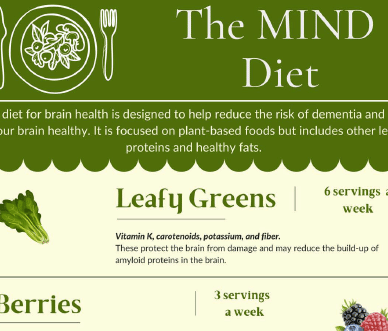
| Food | Servings | Nutrients | Examples |
| Leafy green vegetables | 6 per week | Vitamin K, antioxidants, flavonoids | Spinach, kale, collard greens, beet greens, romaine lettuce, brussels sprouts |
| Berries | 3 – 4 per week | Carotenoids, vitamin C, antioxidants | Strawberries, blueberries, raspberries, blackberries |
| Other vegetables | Daily – a few times a day | Potassium, antioxidants, carotenoids, flavonoids, magnesium, vitamin C | Tomatoes, winter squash, summer squash, green beans, beets, broccoli, cauliflower |
| Seafood | At least 1 x a week | Protein, unsaturated fatty acids, omega-3 fatty acids | Salmon, tuna, cod, haddock, trout, shellfish like scallops and shrimp |
| Whole grains | At least 3 servings a day | Fiber, magnesium, potassium, B vitamins, | Brown rice, whole grain bread, quinoa, barley, farro, wild rice, oatmeal |
| Lean meats | 2 or more servings a week | Protein, iron, zinc, vitamin B12, and other B vitamins | Lean cuts of red meat, poultry, pork |
| Nuts and seeds | 1 serving daily | Protein, fiber, vitamin E, magnesium, unsaturated fats, potassium, antioxidants | Almonds, walnuts, hazelnuts, peanuts, pistachios, sesame seeds, tahini, pumpkin seeds, chia seeds, hemp seeds |
| Beans, pulses, dried peas | 3 or more servings a week | Fiber, protein, magnesium, antioxidants | Chickpeas (garbanzo beans), black beans, split peas, lentils, navy beans, white beans, kidney beans |
| Olive oil | Daily (main cooking oil) | Monounsaturated fats | Extra Virgin Olive Oil |
While this is not a restrictive diet, there are some foods you should limit. This includes fried foods, red meat, sweets like pastries, butter, margarine, and cheese.
I have a lot of MIND Diet-friendly recipes here for you to choose from and more coming all the time! The Red Curry Soup and Italian Bean Salad are two of my favorites!
You can also sign up for my monthly email newsletter and get a FREE 7-day MIND Diet meal plan. Click here to sign up and get your meal plan!
Other things you can do to improve your brain health
In addition to focusing on the food you eat, here are a few other things you can do to power up your brain!
- Get some exercise daily, even if it means just going for a walk with the dog at lunch. Yup, your dog can be an exercise machine! (and is a lot cheaper too) But get outside and get some exercise. When you are active, your heart pumps faster and gets more oxygen and nutrients to your brain.
- Socialize. Get together with friends and family and do something fun. You’ll stimulate different areas of your brain including memories,
- Learn a new skill. Take up golf or learn the newest rage, pickleball. Play a mind-challenging game every day. Wordle works for me!
- Explore: Take a day trip somewhere new or just explore your town and area. The idea is to get out of your house and familiar surroundings and learn about a new area.
Just find something fun and interactive to keep your brain working and challenged. The worst thing you can do is camp out in front of the TV! Okay, a little mind-numbing TV never hurt anyone! Just don’t spend all day or night in front of it or your computer. Get up and move!
Want to learn more and take a deeper dive into improving your brain health? Purchase my book on the MIND Diet for Two today.
(Please note, this post contains affiliate links which means if you make a purchase using this link I will make a small commission at no additional charge to you. Thank you for your support!)

